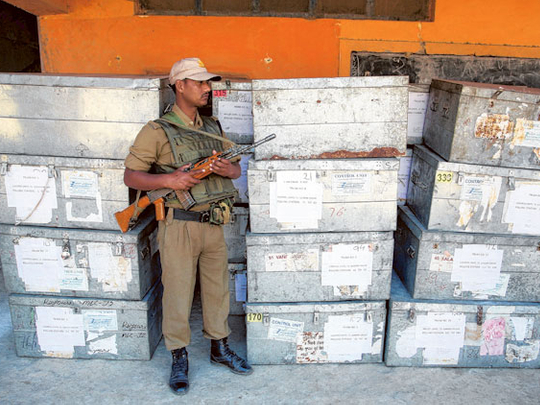
Srinagar: The Kashmir issue has once again taken centrestage in India’s state of Jammu and Kashmir, with some key players — including separatists who called for a poll boycott — showing willingness to move forward with dialogue, even if BJP candidate Narendra Modi becomes prime minister.
The regions will hold its elections from April 10 and until May 7.
While the mainstream parties are busy using their grinded axes against each other, with a series of allegations and counter allegations, separatist leaders are divided over the way forward as regards discussing the Kashmir issue with a future central government.
The main opposition People’s Democratic Party (PDP) — while accusing the ruling National Conference (NC) of being equally responsible for sending to the gallows Afzal Guru, accused of an on the attack Parliament — in its election manifesto makes a special reference to the Kashmir issue.
The party, which sees self-rule as a solution, has promised to work towards building a consensus among the people and various political parties at the national level to resolve the Kashmir issue.
PDP leader Mufti Mohammad Syed, while releasing the manifesto during a recent press conference, held in Srinagar, praised former NDA Prime Minister Atal Bihari Vajpayee for having taken serious and sincere steps to address internal as well as external dimensions of the issue.
Using the Kashmir issue and Mufti’s sudden allegiance towards the NDA — reasons for the secret deal between the PDP and BJP — the National Conference is now accusing the Mufti — who is also the former Union Home Minister — of being instrumental in the imposition of the Armed Forces Special Powers Act (AFSPA) in the state. The law gave sweeping powers for security forces to counter a more than two-decades long insurgency.
The National Conference together with its ally the Congress describes BJP as a communal party and has accused PDP of entering a secret deal with the latter.
While keeping its tradition of describing Kashmir as an issue, the National Conference leadership, during its ongoing campaign has repeatedly promised to fight for its resolution.
It claims restoration of autonomy to the state is the only viable solution.
Pertinently a document prepared by the party, “Autonomy Report” submitted to the centre was out rightly rejected by the then central government headed by Atal Bihari Vajpayee.
Apart from targeting the PDP, the alliance is using the anti-Modi sentiment to scare voters from bringing the BJP into power. The NC has described voting for PDP as being as good as voting for Modi.
Addressing a joint NC and Congress rally at Anantnag in South Kashmir, on Wednesday, National Conference president Dr Farooq Abdullah said that Modi’s victory would destroy the secular fabric of India. While accusing Modi of disrespecting senior party leaders and dislodging them, he asked how such a person could care for the welfare of the people.
State Congress chief Saif-U-Din Soz, while comparing Modi’s vision of India with that of Adolf Hitler’s reign, accused the BJP prime ministerial candidate of being a fascist who wants to create an India similar to the Nazi period.
The BJP’s prime ministerial candidate has also come under heavy criticism from separatist leader Mirwaiz Umar Farooq, who however has surprised political pundits by expressing his willingness to hold talks with Modi, if he becomes prime minister.
Moderate Hurriyat chairman Farooq in a recent statement expressed his willingness to hold talks with a Modi-led government, but set a condition that Modi should emulate Vajpayee and follow his Kashmir policy.
Hard-line separatist leader Syed Ali Shah Geelani, taking exception to Mirwaiz’s suggestion that the Vajpayee-led NDA was better than Prime Minister Manmohan Singh’s UPA government, has criticised his statement saying that none of the national parties has a policy or sincerity towards settling the Kashmir issue.
Although Farooq’s readiness to talk to Modi has also brought him under fire from Yasin Malek, chairman of the pro-freedom Jammu and Kashmir Liberation Front (JKLF), he has some supporters of significance as well.
A relief for Farooq came from Jamaat-e-Islami, a party that Geelani owes his political career to, when it expressed its hope that Modi will shun his hardliner attitude once he comes to power.
Jamaat chief Mohammad Abdullah Wani in his statement said if Modi wins he cannot be a hardliner anymore as he will have to run a country and to think of including everything and everyone.












